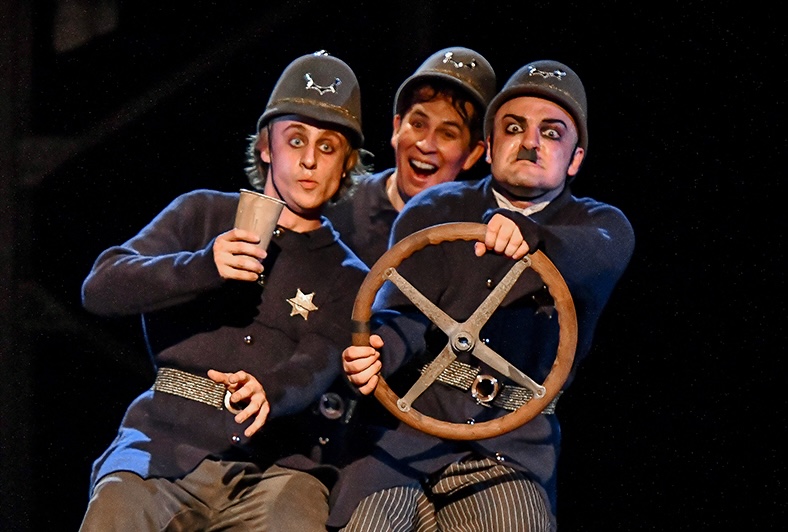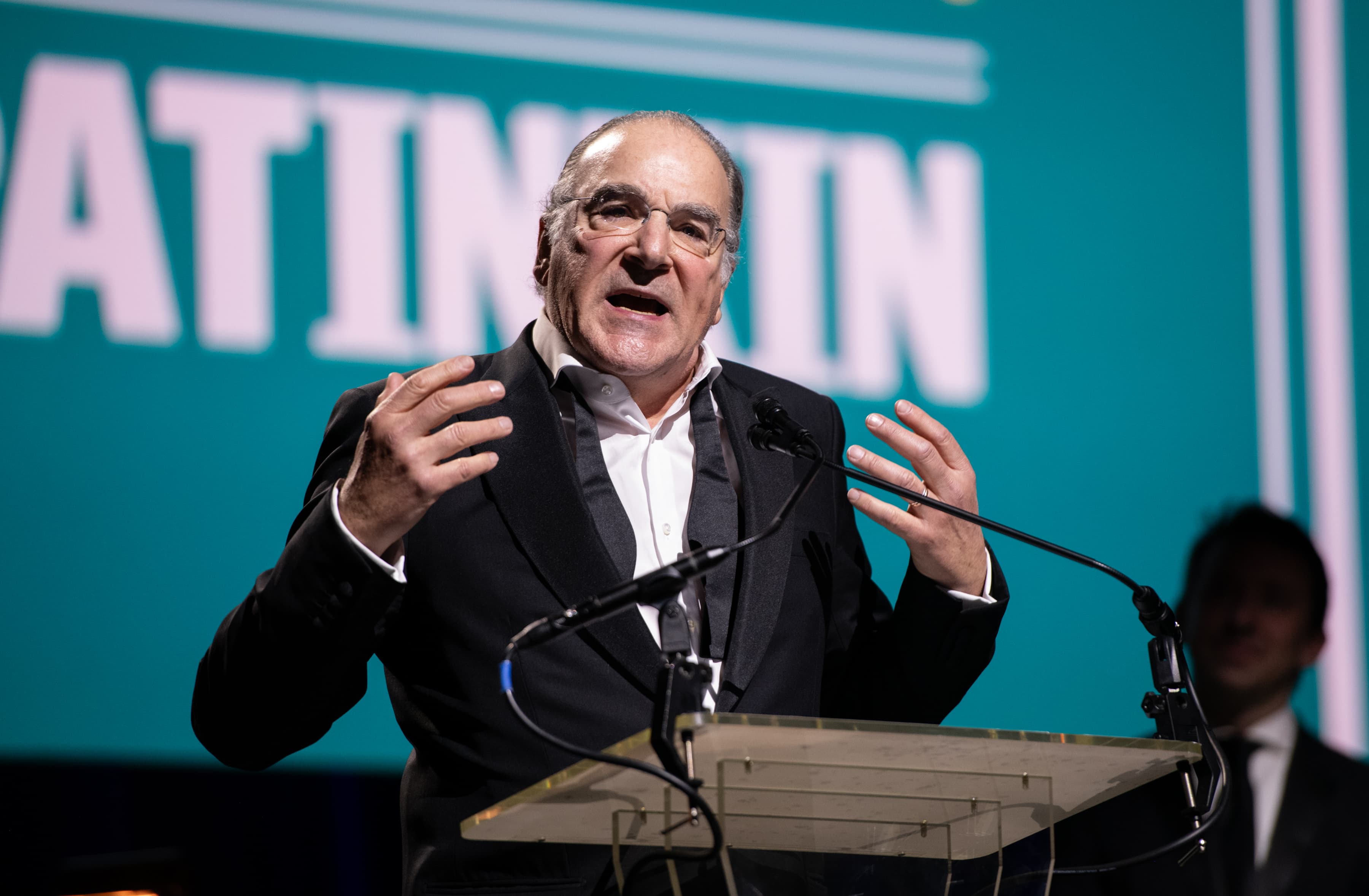A Richly Rewarding “Where the Mountain Meets the Sea” (Review)
Gorgeous musical moments mark the moving story of an immigrant father and gay son in "Where the Mountain Meets the Sea."
By André Hereford on June 2, 2024 @here4andre

While awaiting a proper vehicle to showcase the leading lady talents of theater treasure Awa Sal Secka, we can enjoy, for now, the performer-playwright’s stellar work in the ensemble of Signature’s intimate musical journey Where the Mountain Meets the Sea.
In the D.C. premiere production of Jeff Augustin’s personal tale of a father and son who traverse great distances and differences trying to reconnect, Secka teams with singer-musician Rob Morrison to provide live music and score supporting the drama.
Robert Cornelius, as dad Jean, and Isaac “Deacon Izzy” Bell, as son Jonah, carry the narrative, taking turns telling respective sides of their family’s life story.
The account spun by Haitian immigrant Jean might be a mix of memories that happened and memories he wishes had happened, he admits. Played by Cornelius as a charmer with a million-dollar smile, Jean recounts his days in Jacmel, where he taught elementary school, and dreamed of a life in the States, with his lovely lady friend Emile at his side.
As far as his son Jonah is concerned, Jean, who left Haiti by boat to Miami in 1978, never dreamt he’d have a gay theater artist son, but that’s how things turned out. Now, Jonah’s a Ph.D. candidate in Linguistics living in L.A., involved in a complicated relationship with Carl, whom he describes as a smart, dreamy, married, ginger-haired novelist with eyes of a striking blue that reminds him of the ocean in Haiti.
Jonah also laments that because of his sexuality, he and his father grew apart. His dad died without knowing him fully, or knowing about details of his life like Carl.
So, in an effort to feel closer to someone he can no longer be closer to, Jonah makes a cross-country trek back to Miami to pick up his dad’s remains and return them to Haiti. Along the way, he retraces, in reverse, the cross-country trip that his father and mother originally took to L.A. when Jonah was yet to be born.
From across the divide of time and space, father and son paint a rich picture of Jean’s immigrant experience, and Jonah’s coming-of-age as a first-generation gay Black American. Through monologues, they confess feelings they haven’t spoken, or address one another evoking the conversations they want to have but always chicken out of starting. Some conversations they’ll be too late to have.

Staged by Timothy Douglas — who also directed Signature’s winning 2022 run of The Color Purple — the show laces Jean’s and Jonah’s monologues with songs composed by married duo The Bengsons, and performed sublimely by Secka and Morrison.
The movement between music and monologues, finessed with an assist from choreographer Dane Figueroa Edidi, doesn’t feel seamless, though the ensemble pulls together beautifully for moments when the entire foursome carries a tune.
Bell, an award-winning fixture of the D.C. music scene, doesn’t get to sing enough for the tastes of those of us who enjoyed his distinctly pleasing voice in Signature’s Passing Strange. Cornelius, let’s politely say, sings the right amount as Jean.
Jean’s love for music, he explains, is what prompted his cross-country road trip. Searching for a sound that reminded him of the songs that floated across the mountains back home, he found American folk music. The Bengsons’ gorgeous acoustic tunes, sung by Secka and Morrison, with Morrison on guitar, and Secka playing percussion, indeed weave a transporting spell.
The performers’ supple harmonizing on “Everything to Me,” and tender take on bluegrass ballad “I Was Too Late,” with Secka plucking banjo, coax out all the joyful memories and missed opportunities shared by father and son.
Between songs, Jean regales us with stories of his first Thanksgiving, and his first impression of Carl, as Jonah unapologetically fucks his way across America, seeking connection in the arms of different partners. In the course of his and Jean’s parallel journeys crossing the country, they may never truly meet, but Jonah can find hope in the searching.
Where the Mountain Meets the Sea (★★★★☆) runs through July 7 at Signature Theatre, 4200 Campbell Avenue, in Arlington, Va., with a Pride Night performance on June 28. Tickets are $40 to $99. Call 703-820-9771, or visit www.sigtheatre.org.
Synetic Works its Magic on Charlie Chaplin in ‘The Immigrant’
Synetic's magnificently layered riff on Charlie Chaplin and his most iconic character hits close to home.
By Kate Wingfield on March 27, 2025
Like life imitating art and art imitating life, Synetic Theater currently has rather a lot in common with the subject of their production of The Immigrant, a riff on Charlie Chaplin and his tragic-comic character known as the Little Fellow.
Not only are Synetic's founders themselves immigrants, but the company is now as homeless as Chaplin's character. Add the fact that the headlines don't go a day without covering the plight of immigrants of all stripes, and it's all happening here under the bowler hat.
Of course, having no space to call home is no laughing matter -- especially since Synetic must move between area theaters, even mid-run, as in the case of The Immigrant. This must be taking its toll.
‘Black Bag’ is a Slam-Bang Thriller from Steven Soderbergh
Steven Soderbergh's spicy spy thriller "Black Bag" comes packed with sharp twists, intrigue, and innuendo.
By André Hereford on March 16, 2025 @here4andre
Most A-list filmmakers in the streaming era would be glad, and lucky, to have one decent feature hit theaters in a year. So, snaps up to Steven Soderbergh, back with his second slam-bang film this season, following up January's nifty haunted house thriller Presence with the wily spy thriller Black Bag.
Soderbergh and Presence screenwriter David Koepp load up the sex, lies, and video files for this taut tale of a search for the snake hiding within a nest of secret agents. The top agent, George Woodhouse, portrayed with cool determination by Michael Fassbender, is tasked with rooting out a mole embedded in a black-ops division of British intelligence. Among his list of suspects is his own wife, Kathryn, played with a sly glint in her eye by a brashly brunette Cate Blanchett.
Signature Honors Mandy Patinkin in Emotional Celebration
Ben Platt and Annaleigh Ashford led a heartfelt musical tribute to honor Mandy Patinkin at Signature’s Sondheim Award Gala.
By André Hereford on April 17, 2025 @here4andre
It was Monday in the dark with Mandy Patinkin as Signature Theatre feted this year’s Stephen Sondheim Award honoree with a glowing musical tribute to his career on stage and screen. Joined by Kathryn Grody, his wife of 45 years, Patinkin sat center table at the annual gala, held for the second consecutive year at The Anthem.
The concert venue was ever apt for singing the praises of the Tony and Emmy winning performer, whose artistry in creating roles on Broadway in Evita, The Secret Garden, The Wild Party, and, of course, Sondheim’s Sunday in the Park with George, helped earn him the Sondheim Award, established by Signature in 2009 “to honor an individual for his or her contributions to American Musical Theater.”
Support Metro Weekly’s Journalism
These are challenging times for news organizations. And yet it’s crucial we stay active and provide vital resources and information to both our local readers and the world. So won’t you please take a moment and consider supporting Metro Weekly with a membership? For as little as $5 a month, you can help ensure Metro Weekly magazine and MetroWeekly.com remain free, viable resources as we provide the best, most diverse, culturally-resonant LGBTQ coverage in both the D.C. region and around the world. Memberships come with exclusive perks and discounts, your own personal digital delivery of each week’s magazine (and an archive), access to our Member's Lounge when it launches this fall, and exclusive members-only items like Metro Weekly Membership Mugs and Tote Bags! Check out all our membership levels here and please join us today!
The Magazine
-
Most Popular
 Feds Launch “Snitch Line” Targeting Trans Healthcare
Feds Launch “Snitch Line” Targeting Trans Healthcare  Gay Man is GOP Nominee in Virginia's Lt. Governor Race
Gay Man is GOP Nominee in Virginia's Lt. Governor Race  "Senate Twink" Says Video Sex Scandal Drove Him to Flee U.S.
"Senate Twink" Says Video Sex Scandal Drove Him to Flee U.S.  June Crenshaw Steps Down from Wanda Alston Foundation
June Crenshaw Steps Down from Wanda Alston Foundation  Off-Broadway's 'All the World’s A Stage' Is Tender, Timely, and True
Off-Broadway's 'All the World’s A Stage' Is Tender, Timely, and True  Gallery: Blake Little's Breathtaking 'Construction Nudes'
Gallery: Blake Little's Breathtaking 'Construction Nudes'  'Porn Star University' Started by Gay-for-Pay Creator Andy Lee
'Porn Star University' Started by Gay-for-Pay Creator Andy Lee  Gay Army Reserve Officer in Uniform Sex Video Scandal
Gay Army Reserve Officer in Uniform Sex Video Scandal  Nick Cave: The Wizard of Art
Nick Cave: The Wizard of Art  Abigail Spanberger Backed by HRC in Virginia Governor Bid
Abigail Spanberger Backed by HRC in Virginia Governor Bid
 Feds Launch “Snitch Line” Targeting Trans Healthcare
Feds Launch “Snitch Line” Targeting Trans Healthcare  Gay Man is GOP Nominee in Virginia's Lt. Governor Race
Gay Man is GOP Nominee in Virginia's Lt. Governor Race  June Crenshaw Steps Down from Wanda Alston Foundation
June Crenshaw Steps Down from Wanda Alston Foundation  "Senate Twink" Says Video Sex Scandal Drove Him to Flee U.S.
"Senate Twink" Says Video Sex Scandal Drove Him to Flee U.S.  Abigail Spanberger Backed by HRC in Virginia Governor Bid
Abigail Spanberger Backed by HRC in Virginia Governor Bid  Lesbian Firefighter Awarded $1.75 Million in Lawsuit
Lesbian Firefighter Awarded $1.75 Million in Lawsuit  Nick Cave: The Wizard of Art
Nick Cave: The Wizard of Art  Trans Women Not Legally 'Women,' UK Supreme Court Rules
Trans Women Not Legally 'Women,' UK Supreme Court Rules  Chef’s Best Is A Culinary Extravaganza For A Cause
Chef’s Best Is A Culinary Extravaganza For A Cause  This Week's Advertisers: Nick Cave - April 17, 2025
This Week's Advertisers: Nick Cave - April 17, 2025
Scene
Metro Weekly
Washington's LGBTQ Magazine
P.O. Box 11559
Washington, DC 20008 (202) 638-6830
About Us pageFollow Us:
· Facebook
· Twitter
· Flipboard
· YouTube
· Instagram
· RSS News | RSS SceneArchives
Copyright ©2024 Jansi LLC.











You must be logged in to post a comment.